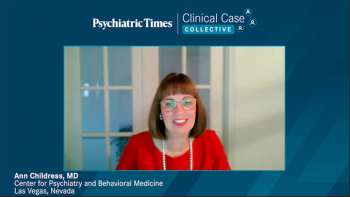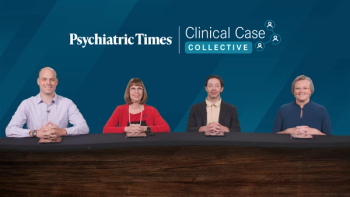Navigating the ADHD Treatment Landscape from Childhood to Adulthood

A panelist discusses how attention deficit/hyperactivity disorder (ADHD) as a common neurodevelopmental disorder characterized by inattention and hyperactive-impulsive behavior, affecting approximately 10.5% of children in the US aged 3 to 17 years with higher prevalence in adolescents and boys, highlighting its various symptoms, potential causes including genetic factors, and mentioning upcoming discussions about treatment options and transitioning care from pediatric to adult settings.

EP. 2: ADHD in Elementary School–Aged Child: Patient Case 1
ByAnn Childress, MD,Stephen Mateka, DO,Michelle Voegels, PMHNP-BC,Michael Asbach, DMSc, PA-C, Psych-CAQ,Kerstin Hazelbaker Panelists discuss how attention-deficity/hyperactivity disorder (ADHD) presents in a 10-year-old boy with combined presentation symptoms, emphasizing the importance of seeing difficulties across multiple settings and noting the genetic component when family history is present.

EP. 3: ADHD Diagnosis Criteria
ByAnn Childress, MD,Stephen Mateka, DO,Michelle Voegels, PMHNP-BC,Michael Asbach, DMSc, PA-C, Psych-CAQ,Kerstin Hazelbaker Panelists discuss how the Diagnostic and Statistical Manual of Mental Disorders, Fifth Edition, Text Revision (DSM-5-TR) criteria for attention-deficity/hyperactivity disorder (ADHD) require at least 6 of 9 symptoms in either inattentive or hyperactive-impulsive domains, with inattentive presentations often unrecognized in girls and highly intelligent students in particular.

EP. 4: Challenges in Diagnosing ADHD
ByAnn Childress, MD,Stephen Mateka, DO,Michelle Voegels, PMHNP-BC,Michael Asbach, DMSc, PA-C, Psych-CAQ,Kerstin Hazelbaker Panelists discuss how diagnostic challenges include ensuring symptoms are developmentally appropriate, distinguishing attention-deficity/hyperactivity disorder (ADHD) from other conditions such as depression and anxiety and using tools such as the NICHQ Vanderbilt Assessment Scales and Connors Comprehensive Behavior Rating Scale to assess symptoms across multiple settings.

EP. 5: Impact of ADHD on Patient’s Quality of Life
ByAnn Childress, MD,Stephen Mateka, DO,Michelle Voegels, PMHNP-BC,Michael Asbach, DMSc, PA-C, Psych-CAQ,Kerstin Hazelbaker Panelists discuss how an attention-deficity/hyperactivity disorder (ADHD) diagnosis impacts families through stress and challenges but can also provide relief and understanding. They address quality-of-life effects including academic performance, family functioning, driving safety, and the need for structure and routine management.

EP. 6: Risk Factors for ADHD
ByAnn Childress, MD,Stephen Mateka, DO,Michelle Voegels, PMHNP-BC,Michael Asbach, DMSc, PA-C, Psych-CAQ,Kerstin Hazelbaker Panelists discuss how attention-deficity/hyperactivity disorder (ADHD) risk factors include genetic, environmental, and socioeconomic influences.

EP. 7: Role of Pediatricians in Diagnosing ADHD
ByAnn Childress, MD,Stephen Mateka, DO,Michelle Voegels, PMHNP-BC,Michael Asbach, DMSc, PA-C, Psych-CAQ,Kerstin Hazelbaker Panelists discuss the critical role of pediatricians in attention-deficity/hyperactivity disorder (ADHD) diagnosis and treatment challenges.

EP. 8: ADHD Treatment Options
ByAnn Childress, MD,Stephen Mateka, DO,Michelle Voegels, PMHNP-BC,Michael Asbach, DMSc, PA-C, Psych-CAQ,Kerstin Hazelbaker Panelists discuss how comprehensive ADHD treatment approaches emphasize combination therapy and immediate implementation.

EP. 9: Nonstimulant Therapies for ADHD
ByAnn Childress, MD,Stephen Mateka, DO,Michelle Voegels, PMHNP-BC,Michael Asbach, DMSc, PA-C, Psych-CAQ,Kerstin Hazelbaker Panelists discuss ADHD nonstimulant medication options with detailed clinical considerations.

EP. 10: Viloxazine for ADHD in Children and Adolescents
ByAnn Childress, MD,Stephen Mateka, DO,Michelle Voegels, PMHNP-BC,Michael Asbach, DMSc, PA-C, Psych-CAQ,Kerstin Hazelbaker Panelists discuss how recent clinical studies on viloxazine in children and adolescents with ADHD demonstrated early symptom improvement, dose-dependent efficacy, and tolerability, with the most benefit seen at 400 mg in those aged 11 and under.

EP. 11: Clinicians’ Experience with ADHD Treatments
ByAnn Childress, MD,Stephen Mateka, DO,Michelle Voegels, PMHNP-BC,Michael Asbach, DMSc, PA-C, Psych-CAQ,Kerstin Hazelbaker Panelists discuss how viloxazine fits into both pediatric and adult attention-deficity/hyperactivity disorder (ADHD) treatment plans, especially as a nonstimulant option for patients with complex cases or concerns about stimulant adverse effects, while emphasizing flexible dosing and caregiver involvement.

EP. 12: Treatment Adherence Challenges in ADHD
ByAnn Childress, MD,Stephen Mateka, DO,Michelle Voegels, PMHNP-BC,Michael Asbach, DMSc, PA-C, Psych-CAQ,Kerstin Hazelbaker Panelists discuss how treatment adherence in patients with attention-deficity/hyperactivity disorder (ADHD) is often impacted by forgetfulness and misconceptions and how using tools such as pill organizers can significantly improve consistency and outcomes.

EP. 13: Adolescent Patient with ADHD: Patient Case 2
ByAnn Childress, MD,Stephen Mateka, DO,Michelle Voegels, PMHNP-BC,Michael Asbach, DMSc, PA-C, Psych-CAQ,Kerstin Hazelbaker Panelists discuss how a 17-year-old patient’s challenges with inattention, anxiety, and executive dysfunction ahead of college highlight the importance of balancing pharmacologic and nonpharmacologic attention-deficity/hyperactivity disorder (ADHD) treatments. They address concerns about stimulant use and medication diversion.

EP. 14: Safety, Monitoring and Transition of Care in Patients with ADHD
ByAnn Childress, MD,Stephen Mateka, DO,Michelle Voegels, PMHNP-BC,Michael Asbach, DMSc, PA-C, Psych-CAQ,Kerstin Hazelbaker Panelists discuss how stimulant and nonstimulant attention-deficity/hyperactivity disorder (ADHD) medications have different adverse effect profiles, with stimulants causing concerns such as misuse potential, cardiovascular effects, tics, and growth suppression.

EP. 15: Patient Case: Impact of ADHD on Quality of Life
ByAnn Childress, MD,Stephen Mateka, DO,Michelle Voegels, PMHNP-BC,Michael Asbach, DMSc, PA-C, Psych-CAQ,Kerstin Hazelbaker Panelists discuss how a patient named Kerstin was diagnosed with attention-deficity/hyperactivity disorder (ADHD) later in life during college when she struggled with organization and scheduling beyond her known dyslexia, leading to successful treatment with various stimulant medications including participation in clinical trials.


